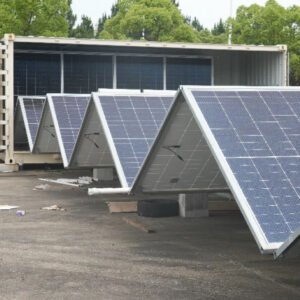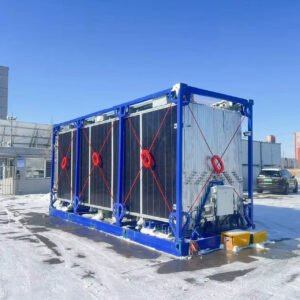What Key Technologies Drive the Performance of New Energy Electric Golf Carts?
•
What Key Technologies Drive the Performance of New Energy Electric Golf Carts?
Is your old golf cart struggling with power and range? This frustration can spoil your game. Discover how new energy technologies deliver superior performance and reliability on the course.

Modern electric golf carts achieve superior performance through a combination of high-density lithium batteries for extended range, efficient AC motors for more power, and advanced lightweight materials for better handling and efficiency. These elements work together to create a smooth, powerful, and reliable ride.
The leap in performance isn't just about one component; it's a symphony of technological advancements working in harmony. To truly understand what makes today's electric golf carts superior, we need to dive into the core innovations that power them. Let's break down the key areas that are transforming your ride from the ground up.
How is Battery Endurance Improved and Applied in Modern Golf Carts?
Worried your cart's battery won't last the full 18 holes? This range anxiety is frustrating. Advanced lithium batteries solve this, offering extended endurance for worry-free, all-day performance.
Battery endurance is improved primarily through the adoption of high-energy-density lithium-ion phosphate (LiFePO4) batteries. These are lighter, charge faster, have a longer lifespan, and provide consistent power compared to traditional lead-acid batteries, making them ideal for demanding golf course applications.
The switch from traditional lead-acid to modern lithium batteries is the single most impactful upgrade for electric golf cart endurance. Brands like EDACAR leverage these advanced power sources across models like the Siera and Breeze to deliver a better experience.
The Lithium Advantage
Unlike their bulky, high-maintenance predecessors, modern lithium batteries offer a superior power solution. An integrated Battery Management System (BMS) is also crucial, as it protects against overcharging, deep discharging, and temperature extremes, ensuring safety and longevity.
| Feature | Traditional Lead-Acid | Modern Lithium (LiFePO4) |
|---|---|---|
| Lifespan | 500-1,000 Cycles | 3,000-5,000+ Cycles |
| Weight | Heavy | ~50% Lighter |
| Maintenance | Requires regular watering | None |
| Charge Time | 8-10 hours | 2-4 hours |
| Performance | Fades as discharged | Consistent power output |
What Are the Best Solutions for Optimizing a Golf Cart's Driving System and Power Efficiency?
Does your cart feel sluggish on hills? This lack of responsive power is inefficient and frustrating. Modern AC motors and smart controllers deliver superior torque and efficiency for a powerful ride.
Optimizing the driving system involves pairing a high-efficiency AC (Alternating Current) motor with an advanced motor controller. This combination provides superior torque for climbing hills, smoother acceleration, and regenerative braking to recapture energy, significantly boosting overall power efficiency and extending battery range.
The motor and controller are the heart and brain of your golf cart's powertrain. The synergy between these two components dictates how efficiently your cart converts battery energy into motion, especially under load.
AC vs. DC Motors: The Power Shift
Modern carts, including the entire EDACAR lineup, utilize powerful 4KW or 5KW AC motors. These are more efficient, require less maintenance than older DC motors, and excel at providing instant torque for climbing.
The Controller: The Brains of the Operation
The controller manages the power flow, ensuring smooth acceleration and enabling features like regenerative braking, which captures energy during deceleration to slightly recharge the battery and boost range.
| Motor Type | Key Advantage | Common Application |
|---|---|---|
| DC (Direct Current) | Lower initial cost | Older or entry-level models |
| AC (Alternating Current) | Higher efficiency, more torque, regen braking | Premium models like the EDACAR line |
What Are the Practical Applications of Lightweight Design in Golf Electric Vehicles?
Are heavy carts damaging turf and feeling sluggish? This poor handling wastes energy and harms the course. Lightweight design boosts efficiency and agility for a nimbler, turf-friendly ride.
Lightweight design in practice involves using aircraft-grade aluminum frames and high-strength polymer bodies instead of traditional steel. This reduces the vehicle's overall weight, which directly improves battery range, enhances acceleration and handling, and minimizes turf compaction for a course-friendly footprint.
A cart's performance isn't just about power; it's also about pounds. Reducing weight is a fundamental engineering principle that enhances nearly every aspect of performance, from efficiency to maneuverability.
The Material Difference
Shifting from a heavy steel chassis to a robust, corrosion-resistant aluminum frame is a critical first step. This weight saving has a cascading effect on the entire vehicle's performance.
The Ripple Effect of Reduced Weight
A lighter cart requires less energy to move, directly extending the range of the battery and motor system. It also improves agility, steering response, and acceleration while significantly lessening the vehicle's impact on delicate fairways and greens.
| Design Factor | Benefit | Impact on Performance |
|---|---|---|
| Aluminum Chassis | Reduced Weight & High Strength | Better acceleration, less turf compaction |
| Lighter Battery | Lithium is naturally lighter | Extended battery range, improved handling |
| Polymer Body | Durable and Light | Contributes to overall efficiency and agility |
Conclusion
The fusion of lithium batteries, efficient AC drive systems, and smart lightweight design defines modern electric golf cart performance, delivering a superior, reliable, and enjoyable experience on and off the course.




